October is Filipino American History Month, which commemorates the first Filipinos to arrive on the North American continent at what is now Morro Bay, California, on October 18, 1587. In October 2009, the US Congress passed a resolution officially recognizing the commemorative month.
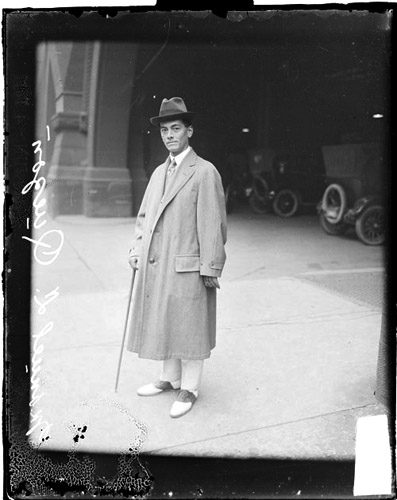
Portrait of Manuel L. Quezon, President of the Philippines, standing on the corner of a sidewalk, Chicago, 1917. DN-0067971, Chicago Daily News Collection, CHM
Before the Tydings-McDuffie Act of 1934, which led to the Philippines becoming an independent country, Filipinos immigrated to the States primarily as pensionado and family-sponsored students while the Philippine Islands was a US territory. The Pensionado Act (1903) was a program that Manuel Quezon, who later became the second president of the Philippines, passionately lobbied for in Congress and established scholarships after the Philippine-American War (1899–1902) to allow Filipinos to attend school in the States. His goal was to have a generation of young Filipinos who could become capable, democratic leaders in the Islands.
Chicago was one of the Midwest cities where ambitious, young Filipino men attended elite universities as well as to combat stereotypes from the war. They not only participated in campus life, but also in the local labor force and contributed to major movements as many settled in Chicago after immigration laws completely excluded Asians.
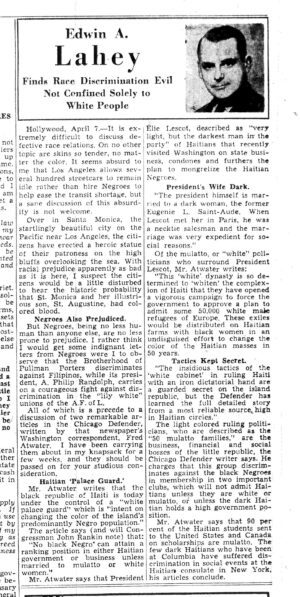
Edwin A. Lahey, “Finds Race Discrimination Evil Not Confined Solely to White People,” Chicago Daily News, p. 14, April 7, 1944.
Filipino workers also played an unintentional role in negotiations between the Brotherhood of Sleeping Car Porters (BSCP) and the Pullman Company. To intimidate African American porters from joining the Brotherhood, the Pullman Company hired Filipino workers as replacements and published takedown articles to pit them against their African American coworkers. A Chicago Daily News article published April 7, 1944, insisted that the BSCP discriminated against Filipinos.
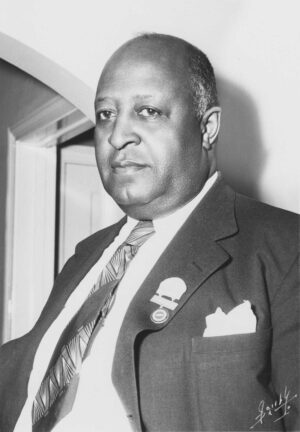
Milton P. Webster of the Brotherhood of Sleeping Car Porters, 1951. CHM, ICHi-024898
However, many of the Filipinos who came during the early pensionado years were dues paying members of the BSCP Chicago Chapter, too. Chicagoan Milton Webster, vice president of the BSCP and lead negotiator, was asked by Filipino members to respond to the Daily News article and in an open letter dated April 19, 1944, he dispelled the notion that the Brotherhood discriminated against Asian workers: “A substantial number of our paid up members in the city of Chicago, where we have for eighteen years maintained a local division of which I am the president, are Filipinos. They occupy positions in the official staff. They enjoy every right and privilege in this Organization that the Constitution provides.”
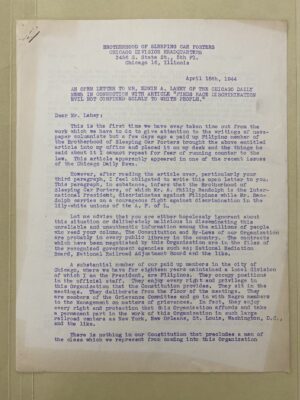
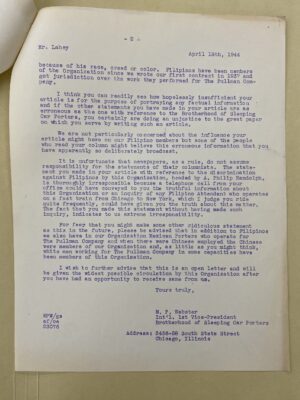
Letter from Milton P. Webster to Edwin A. Lahey, April 18, 1944. Brotherhood of Sleeping Car Porters, box 6, folder 11. Photograph by CHM staff.
Additional Resources
- Read the Encyclopedia of Chicago entry about Filipinos
- Peruse our archival items related to the Brotherhood of Sleeping Car Porters
See what people are saying!